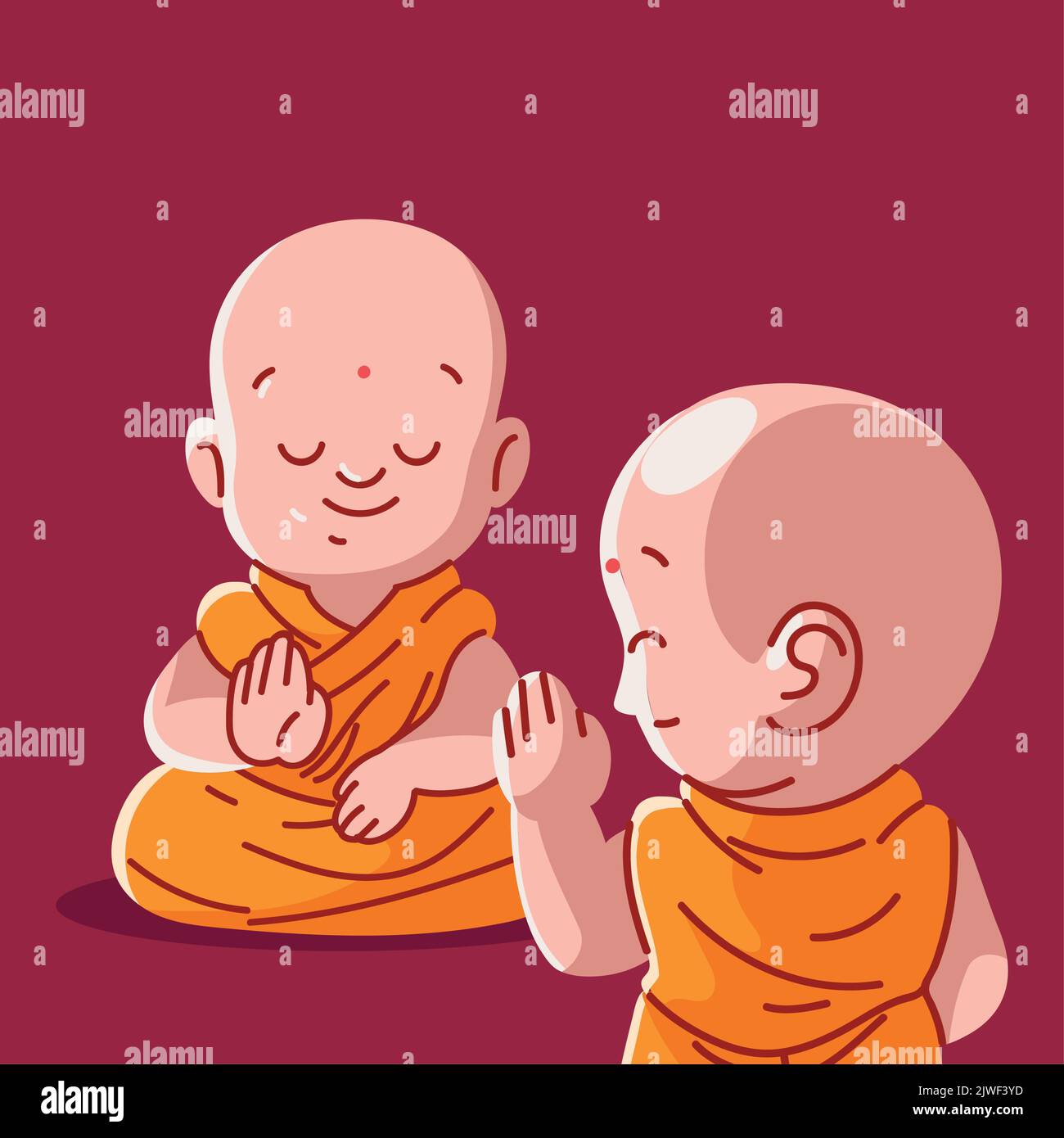Good Names For Monks: A Deep Dive Into Sacred And Inspiring Choices
When it comes to choosing good names for monks, the journey is both spiritual and deeply personal. Monastic life demands a connection to something greater, and the name you choose becomes a reflection of that commitment. It’s not just about picking a word or phrase; it’s about embodying the values, history, and essence of monastic traditions. Whether you’re stepping into this sacred path yourself or simply exploring the world of monk names, we’re here to guide you through the process.
Monastic names carry weight. They’re more than just labels—they’re symbols of devotion, discipline, and purpose. In many religious traditions, monks adopt new names as part of their transformation, leaving behind their old identities to embrace a life of service and contemplation. This isn’t just a ritual; it’s a profound statement of intent. The right name can inspire, uplift, and remind monks of their sacred mission every single day.
So, whether you’re searching for traditional options rooted in ancient texts or modern interpretations that resonate with contemporary spirituality, this article has got you covered. Let’s dive in and explore some truly meaningful good names for monks that will leave you inspired and informed.
Read also:Julia Collins The Rise Of A Tech Entrepreneur Shaping The Digital Landscape
Why Naming Matters in Monastic Life
Choosing a name for a monk isn’t something done lightly. In fact, it’s one of the most important decisions in the entire monastic journey. Think about it: when someone decides to become a monk, they’re essentially starting a new chapter in life. Their old identity fades away, and a new one emerges—one that aligns with their spiritual calling. The name they choose becomes an anchor, grounding them in their purpose and guiding them on their path.
Historically, monastic naming ceremonies have been steeped in tradition. Monks often receive names that reflect qualities like humility, wisdom, or divine connection. These names aren’t arbitrary; they’re carefully selected based on the individual’s journey, the monastery’s values, or even visions from higher powers. For example, the name "Benedict" (meaning "blessed") was famously adopted by Saint Benedict of Nursia, whose Rule continues to influence monastic life worldwide.
But why does all this matter? Well, names shape identity. They influence how we see ourselves and how others perceive us. A monk’s name serves as a constant reminder of their vows, encouraging them to live up to the ideals embodied by that name. And that’s powerful stuff.
Top 10 Good Names for Monks
Now that we’ve established why naming is so crucial, let’s get down to business. Here’s a list of ten top-notch names that make excellent choices for monks:
- Ignatius – Derived from Latin, meaning “fiery.” Perfect for monks seeking inner strength and passion.
- Francis – Inspired by Saint Francis of Assisi, this name embodies simplicity, humility, and love for nature.
- Thomas – Meaning “twin,” this name carries connotations of faith and doubt, making it ideal for those on a journey of discovery.
- Anthony – A classic choice, Anthony means “priceless” and honors the famous Desert Father, Saint Anthony.
- Gregory – From the Greek word meaning “watchful,” Gregory is perfect for monks who value vigilance and mindfulness.
- John – Simple yet profound, John means “God is gracious” and has been used by countless saints and mystics.
- Benedict – As mentioned earlier, this name symbolizes blessing and is deeply tied to Western monastic traditions.
- Augustine – Meaning “great” or “magnificent,” Augustine honors one of Christianity’s greatest theologians.
- Jerome – Another timeless classic, Jerome means “sacred name” and reflects the importance of spiritual devotion.
- Patrick – Popularized by Saint Patrick, this name signifies nobility and missionary zeal.
Each of these names carries rich history and symbolism, making them perfect fits for monks at any stage of their journey.
Subheading: Exploring the Meaning Behind Monk Names
Understanding the Roots of Monastic Names
To truly appreciate good names for monks, it’s essential to understand where they come from. Many monastic names originate from ancient languages like Latin, Greek, and Hebrew. These languages were sacred in early Christian and Buddhist traditions, so names derived from them carry added significance.
Read also:7starhd Movies Your Ultimate Guide To Streaming Highquality Movies
For instance, the name “Paul” comes from the Latin word “paullus,” meaning “small” or “humble.” This name was famously adopted by Saint Paul, whose conversion and missionary work transformed early Christianity. Similarly, the name “Peter” (meaning “rock”) was given to Simon by Jesus himself, symbolizing his role as the foundation of the Church.
Even in Eastern traditions, monastic names hold deep meaning. In Buddhism, monks might take names inspired by enlightened beings, such as Gautama (after Siddhartha Gautama, the historical Buddha) or Avalokiteshvara (the bodhisattva of compassion).
Factors to Consider When Choosing a Monk Name
Picking the right name for a monk involves more than just flipping through a list of suggestions. There are several factors to consider:
- Personal Significance: Does the name resonate with your personal story or spiritual journey?
- Cultural Context: Is the name appropriate within the cultural and religious framework of your monastery?
- Sound and Vibe: How does the name feel when spoken aloud? Is it easy to pronounce and remember?
- Symbolic Meaning: What values or qualities does the name represent, and do they align with your monastic goals?
By carefully weighing these factors, you can ensure that the name you choose feels right and serves its intended purpose.
Subheading: Monastic Naming Traditions Around the World
Western Christian Traditions
In Western Christianity, monastic naming practices vary slightly depending on the order. For example, Benedictine monks often draw inspiration from the Rule of Saint Benedict, adopting names that emphasize humility, obedience, and community. Meanwhile, Franciscan monks might choose names associated with nature, simplicity, and poverty, reflecting the values of Saint Francis.
Eastern Orthodox Traditions
Eastern Orthodox monks also place great emphasis on naming. Names are typically chosen during the tonsure ceremony, which marks the formal entry into monastic life. These names often honor saints or martyrs whose lives exemplify the virtues the monk aspires to cultivate.
Buddhist Traditions
In Buddhism, monk names often reflect the Dharma teachings or specific aspects of enlightenment. For example, a monk might adopt a name like “Dhammasami,” meaning “one who dwells in Dhamma,” or “Saddhammapala,” meaning “guardian of the true Dhamma.”
How to Create Your Own Monk Name
If none of the traditional names feel quite right, don’t worry! You can always create your own monk name. Here’s a step-by-step guide:
- Reflect on your spiritual journey and identify key themes or qualities you want to embody.
- Research words or phrases in ancient languages that align with those themes.
- Combine elements to form a unique name that feels authentic and meaningful to you.
For example, if you value peace and wisdom, you might blend the Latin word “pax” (peace) with the Greek word “sophia” (wisdom) to create a name like “Paxsophia.” Get creative and let your imagination run wild!
Subheading: Popular Monk Names in Modern Times
Contemporary Trends in Monastic Naming
While traditional names remain popular, there’s been a growing trend toward more modern, accessible options. Today’s monks might choose names that reflect their individuality while still honoring monastic traditions. Examples include:
- Aaron – Meaning “mountain of strength,” this name combines biblical roots with a contemporary vibe.
- Lucas – From the Greek “lux,” meaning “light,” Lucas is both classic and fresh.
- Ethan – Meaning “strong” or “firm,” Ethan resonates with those seeking steadfastness in their faith.
These names show that monastic identity doesn’t have to be confined to ancient texts. It can evolve with the times while staying true to its core principles.
Resources for Finding Good Names for Monks
Need a little extra help in your search? Here are some resources to check out:
- Catholic Online – A treasure trove of saint names and biographies.
- BBC Religion – Offers insights into various religious traditions and naming customs.
- BuddhaNet – Provides information on Buddhist practices, including monk naming traditions.
These websites offer reliable, well-researched content to support your quest for the perfect monk name.
Conclusion: Your Journey Begins Here
Choosing good names for monks is a beautiful and meaningful process. Whether you’re inspired by ancient traditions or modern interpretations, the name you select will become an integral part of your monastic identity. Remember, the right name can inspire, guide, and uplift you throughout your journey.
So, take your time, do your research, and trust your intuition. And once you’ve found the perfect name, don’t forget to share your story with others. Who knows? Your journey might inspire someone else on theirs!
Until next time, keep shining bright—and may your path be filled with peace, purpose, and plenty of good names for monks!
Table of Contents
- Why Naming Matters in Monastic Life
- Top 10 Good Names for Monks
- Subheading: Exploring the Meaning Behind Monk Names
- Understanding the Roots of Monastic Names
- Factors to Consider When Choosing a Monk Name
- Subheading: Monastic Naming Traditions Around the World
- Western Christian Traditions
- Eastern Orthodox Traditions
- Buddhist Traditions
- How to Create Your Own Monk Name
- Subheading: Popular Monk Names in Modern Times
- Contemporary Trends in Monastic Naming
- Resources for Finding Good Names for Monks
- Conclusion: Your Journey Begins Here


